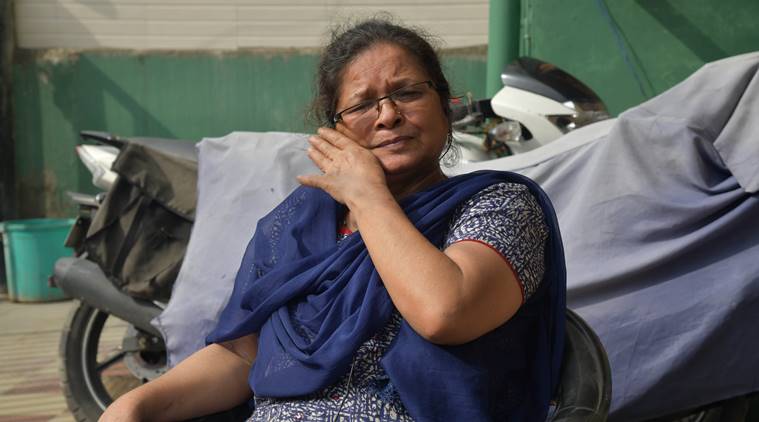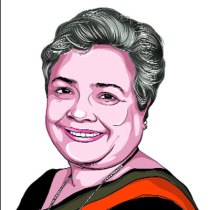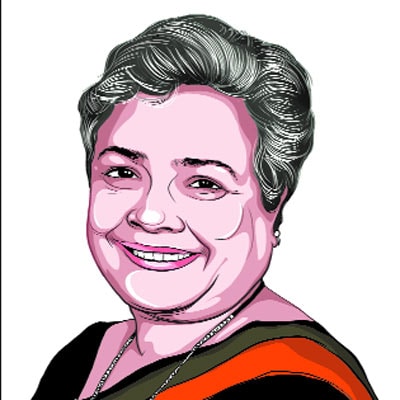Betraying Uttara
Uttarakhand teacher’s plea, response to it, reveal government’s attitude to educators.

Uttara Pant Bahuguna is a school teacher who was consistently posted in some of the remotest villages in Uttarkashi district since 1993. (Express photo)
It is incorrect to assume that if one is far away, one can take bad news from home on the chin. Interacting with a community of journalist friends from Uttarakhand constantly, the exact opposite seems true. Even the cheerful Pan Singh at the tea stall, or your usually quiet, self-effacing driver, Dharamvir Singh, all of whom migrated from the area to earn a living like you, are quite shaken by the public humiliation of a humble, ageing school teacher from a remote village, by the chief minister of Uttarakhand .
The bare bones of the story are as follows: Uttara Pant Bahuguna is a school teacher who was consistently posted in some of the remotest villages in Uttarkashi district since 1993. Separated from his family, her husband working in Dehradun, had begun drinking heavily and she petitioned the department repeatedly for a posting to Dehradun on compassionate grounds. Her petitions failed and in 2015, her children lost their father.
Last week, Trivendra Singh Rawat held a Janata Durbar, where this 57-year-old widow, deeply upset about being denied a transfer repeatedly, approached the CM directly. During the questioning that followed, she got worked up and is alleged to have shouted at the CM after he threatened her with immediate suspension and arrest. Directly ordered by the CM, Bahuguna was then dragged away by the police. She has since been suspended, we learn, on grounds of insubordination. This ugly drama played out in front of journalists and cameras. It, however, received muted coverage in the mainstream media that the locals now call the “Godi Media”.
As happens frequently, the reports and visuals soon went viral in the social media and a furious debate broke out. This was embarrassing for a government repeatedly promoting the central government’s “Beti Bachao, Beti Padhao” and Holy Devbhumi campaigns. Soon, a senior government official called a press conference to justify the punishment to Bahuguna on grounds that she had violated the code of conduct by appearing unaccompanied by any department official and then “misbehaving” by repeatedly asking when exceptions were being made in many cases, why, in her case, a transfer remained an impossibility. According to local sources, the CM is himself married to a school teacher who has been serving in Dehradun at the Government Sugam Vidyalaya at Dehradun since 1992 and even received a promotion in situ in 2008.
It is common knowledge that with minimal consultation and a little outright deceit, most state governments maintain clear double standards for transfers and promotions of rural school teachers and health workers. Reading their stories alongside the national stories about reforms and mergers in public sector banks and the corporate sector, it is clear that more or less the same traits and opacity are on display. For example, most of the vital and wide-ranging decisions about education, health and agriculture are made neither at Janata Durbars nor in the Niti or some other Aayog. The big picture is created in closed-door meetings, around the dining tables of a tiny elite. And the chain of decision-making within various government departments at the district and taluka levels must support and sustain the big picture.
For many Indians, the question about a government-run school system in the hills remains imponderable. They send their children to exclusive residential schools in the hills, which have an air of joy and goodness surrounding them. A few home-educate their children through the latest technological means. For them, a school offers pleasant environs and an incremental increase in literacy and cognitive skills. The learning that arose out of a plurality of individual spaces and languages in the government schools I attended in the 1960s — encouraging interaction between children of People Like Us (PLUs) and those unlike us, but equally bright and ambitious — has long ceased to have any appeal for India’s metro-based middle classes.
A government school, especially in remote hilly areas, is one of those social goods that matter to local people in ways unthinkable to many of us. It is, however, still a significant part of the larger social reality, one of the few things in each district that does not want our soul or our wallet. If the tragedy of our rural teachers, who keep a vast system alive and ticking, is to be understood in its proper context, the very least Trivendra Singh Rawat and his ilk can do is to listen patiently when a beleaguered widow asks him whether in this system that has claimed and wrecked most of her own conjugal life, youth and energy, her vital needs should not matter at least as much as the CM’s wife’s?
The writer is senior journalist and former chairperson of Prasar Bharati
For all the latest Opinion News, download Indian Express App
More From Mrinal Pande
- Tunes of DissentThe mind of an Indian artist who has always called out the wrong notes of a rigid, stratified classical music ecosystem ..
- Lage raho, Naresh bhaiWhen men begin to lose power, they begin to lose control over their speech...
- A deceit called autonomyPrasar Bharati Act vests authority, resources in the corporation. I&B ministry still owns all that it surveys ..








































No hay comentarios:
Publicar un comentario